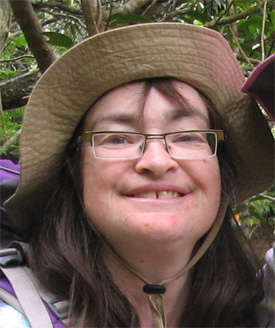Introducing New Staff 25
My research interests and seleted publications

BERGE, Anna Mary Sophia
(Visiting professor, January 2013)
I am an Associate Professor of Linguistics at the Alaska Native Language Center (ANLC), University of Alaska Fairbanks. I obtained my Ph.D. in Linguistics from the University of California, Berkeley, in 1997; my dissertation work involved an analysis of clause chaining, switch-reference, topic tracking, and discourse structure in West Greenlandic, an Inuit language in the Eskimo-Aleut language family. I also obtained an M.L.I.S. degree (Library and Information Studies) in 1993 from the same institution. Following my graduation, I had a postdoctoral NSF Fellowship at the Institute for Eskimology in Copenhagen, Denmark from 1999-2000, where I studied early Greenlandic texts, focusing on syntactic constructions involving verbs of elocution. I have been a professor at the ANLC from 2001, during which time I have focused on the study of comparative Eskimo-Aleut, and, since 2002, on the documentation and revitalization of Unangam Tunuu (Aleut). I received an NSF CAREER award in 2004 for research on the latter. Since 2010, I have been a foreign collaborator on two recently completed joint research projects through the Linguistics Dynamics Science Project (LingDy) at the Research Institute for Languages and Cultures of Asia and Africa (ILCAA), Tokyo University of Foreign Studies (TUFS). These were the projects “Comparative Study on the Languages of the Pacific Rim from Typological Perspective” led by Dr. Tokusu Kurebito, and “Cross-linguistic Studies on Clause Combining,” led by Dr. Honoré Watanabe.
At present, I am a Visiting Professor at ILCAA, at the invitation of Dr. Tokusu Kurebito. My research here focuses on the differentiation of the Aleut and Eskimo languages and the language internal and external changes that might have led to the present state of the language; my purpose is to clarify the nature of the relationship of Aleut and Eskimo languages from a comparison of their respective morphosyntactic traits. I have presented an overview of this work at an ILCAA Forum meeting (2013/05/09: Linguistic divergence between Eskimo and Aleut). I was also a guest lecturer for the 6th Documentary Linguistics Workshop (2013/02/11: Language Documentation among the Unangan (Aleut)).
My areas of expertise include the (diachronic and synchronic study of the) Eskimo-Aleut Languages, documentation and description of endangered languages, and the typology, morphology, syntax, and discourse structures of polysynthetic languages (specifically of Alaskan languages).
Selected publications include:
Most recent books: 2011 Topic and Discourse Structure in West Greenlandic Agreement Constructions. Lincoln: University of Nebraska Press. 2010 Revitalisation et documentation de la langue chez les Aléoutes en Alaska. for Les Documents de Recherches Yawenda. Québec: Université Laval. 2009 Niiĝuĝis Mataliin Tunux̂tazangis / How the Atkans Talk: A Conversational Grammar, with 7 accompanying CD’s; co-authored with Moses Dirks. Fairbanks: ANLC.
Most recent relevant articles: 2013 Object Reduction in Aleut Linguistic Typology of the North, vol. 3. ed. by Tokusu Kurebito. Tokyo: ILCAA. 2010 La recherche de terrain en milieu urbain. Les Cahiers du CIÉRA. Québec: CIÉRA; Coordination in Pribilof Islands Unangam Tunuu. Linguistic Discovery. http://linguistic-discovery.dartmouth.edu; Origins of linguistic diversity in the Aleutian Islands. Human Biology 84:4 (October-December 2010 special issue), 557-582; Adequacy in documentation. Language Documentation: Practice and Values, ed. by N. Louanna Furbee and Lenore A. Grenoble. Amsterdam: John Benjamins, 73-95; Unexpected non-anaphoric marking in Aleut. Rara & Rarissima: Documenting the fringes of linguistic diversity, ed. by Jan Wohlgemuth / Michael Cysouw:Berlin, New York: Mouton de Gruyter, 2010. (= Empirical Approaches to Linguistic Typology (EALT); 46), 1-22. 2009 Tracking topics: A comparison of “topic” in Aleut and Greenlandic discourse. Variations in Polysynthesis: The Eskaleut Languages, ed. by Marc-Antoine Mahieu and Nicole Tersis. Typological Studies in Language 86. John Benjamins, 185-200.
Copyright © 2010 Research Institute for Languages and Cultures of Asia and Africa. All Rights Reserved.
